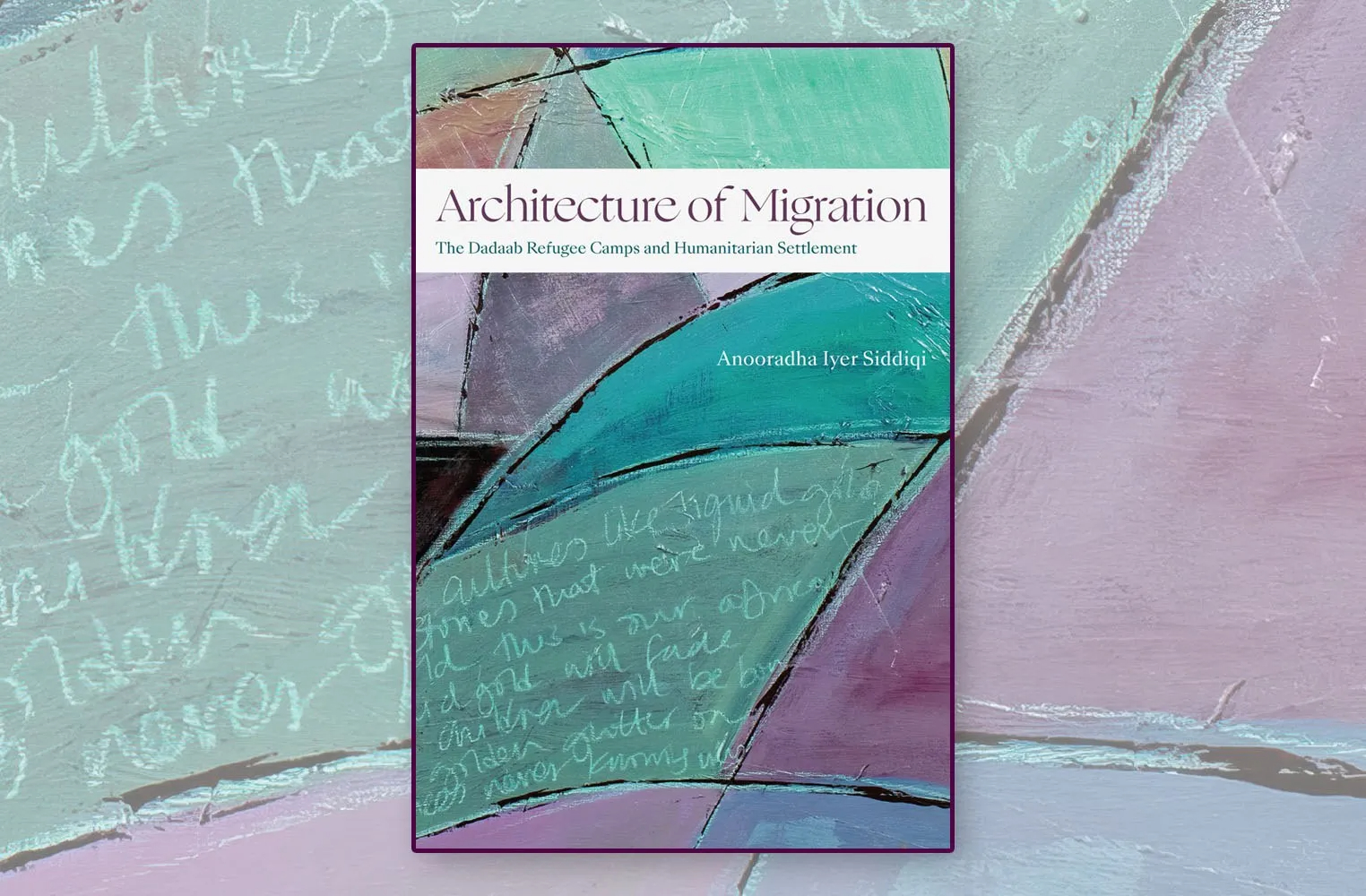
Heyman Center 2nd Floor Common Room, East Campus
Society of Fellows and Heyman Center for the Humanities
Office of the Divisional Deans in the Faculty of Arts and Sciences, Barnard and Columbia Colleges Architecture Department, Institute for African Studies, South Asia Institute, Institute for Comparative Literature and Society
Registration is required for this event. For in-person attendance, please register here, and for virtual attendance, please register here.
Architecture of Migration: The Dadaab Refugee Camps and Humanitarian Settlement
by Anooradha Iyer Siddiqi
Environments associated with migration are often seen as provisional, lacking both history and architecture. As Anooradha Iyer Siddiqi demonstrates in Architecture of Migration, a refugee camp’s aesthetic and material landscapes—even if born out of emergency—reveal histories, futures, politics, and rhetorics. She identifies forces of colonial and humanitarian settlement, tracing spatial and racial politics in the Dadaab refugee camps established in 1991 on the Kenya-Somalia border—at once a dense setting that manifests decades of architectural, planning, and design initiatives and a much older constructed environment that reflects its own ways of knowing. She moves beyond ahistorical representations of camps and their inhabitants by constructing a material and visual archive of Dadaab, finding long migratory traditions in the architecture, spatial practices, landscapes, and iconography of refugees and humanitarians. Countering conceptualizations of refugee camps as sites of border transgression, criminality, and placelessness, Siddiqi instead theorizes them as complex settlements, ecologies, and material archives created through histories of partition, sedentarization, domesticity, and migration.
About the Author
Anooradha Iyer Siddiqi is an Assistant Professor of Architecture at Barnard College, and co-editor of Feminist Architectural Histories of Migration and Spatial Violence. She specializes in histories of architecture, modernity, and migration, centering African and South Asian questions of historicity and archives, heritage politics, and feminist and colonial practices. Her scholarship aims to foreground histories of marginalized people and figures and promote practices of collaboration and support, especially concerning the lives and narratives of communities that have been systematically excluded or silenced. Thinking through objects, buildings, and landscapes, her work examines intellectual histories and diverse forms of esthetic practice and cultural production. She is working on a book titled “Ecologies of the Past” that analyzes the politics of heritage environments through the work of Sri Lankan architect Minnette de Silva and art historian Anil de Silva-Vigier.
About the Speakers
Hiba Bou Akar is an Associate Professor in the Urban Planning program at Columbia GSAPP. Her research focuses on planning in conflict and post-conflict cities, the question of urban security and violence, and the role of religious political organizations in the making of cities. Bou Akar’s book, For the War Yet to Come: Planning Beirut’s Frontiers, published by Stanford University Press in 2018, examines how Beirut’s post-civil war peripheries have been transformed through multiple planning exercises into contested frontiers that are mired in new forms of conflict. It contributes to planning thought by studying planning practice within a framework of past and anticipated violence. Currently, Bou Akar is working on a new project entitled “Sedimentary Urbanization.”
Brian Larkin is the Director of Graduate Studies and a Professor of Anthropology at Barnard College, Columbia University. His research focuses on the ethnography and history of media in Nigeria. Most broadly he examines the introduction of media technologies into Nigeria—cinema, radio, digital media—and the religious, political, and cultural changes they bring about. Larkin is Co-Director of the Comparative Media Initiative at Columbia University and co-founder of the University Seminar on Media Theory and History. He is a board member of the Institute for African Studies and the Temple Hoyne Buell Center for the Study of American Architecture, and a member of the Committee on Global Thought. He is the current Governing Board Co-Chair of The Society of Fellows and Heyman Center for the Humanities.
Anupama Rao is a Professor of History at Barnard College. Her research and teaching interests include gender and sexuality studies; caste and race; historical anthropology; social theory; comparative urbanism; and colonial genealogies of human rights and humanitarianism. She is the Director of the Institute for Comparative Literature and Society and the convenor of the Ambedkar Initiative, which is supported by the Provost’s Office (Barnard), the Deans of Humanities and Social Sciences (Columbia), the Office of the EVP (Columbia), Columbia University Press, and the Columbia Libraries. She served as Senior Editor, Comparative Studies in South Asia, Africa, and the Middle East from 2012-2021 and was involved in bringing the journal to be housed at Barnard and Columbia and in developing its distinctive vision and focus together with Professor Timothy Mitchell.
Miriam Ticktin is a Professor of Anthropology at the CUNY Graduate Center. Her research has focused in the broadest sense on what it means to make political claims in the name of a universal humanity, although her current research is more interested in imagining and opening the way to new political formations. She has written on immigration, humanitarianism, and border walls in France and the US and how bodies and biologies are shaped by gender, race and class. Ticktin is finishing a book entitled “Beyond Innocence,” which explores the political work done by the concept of innocence, tracking how, in the Euro-American context, discourses and images of innocence get assembled and weaponized.
Please email disability@columbia.edu to request disability accommodations. Advance notice is necessary to arrange for some accessibility needs. This event will be recorded. By being present, you consent to the SOF/Heyman using such video for promotional purposes.







